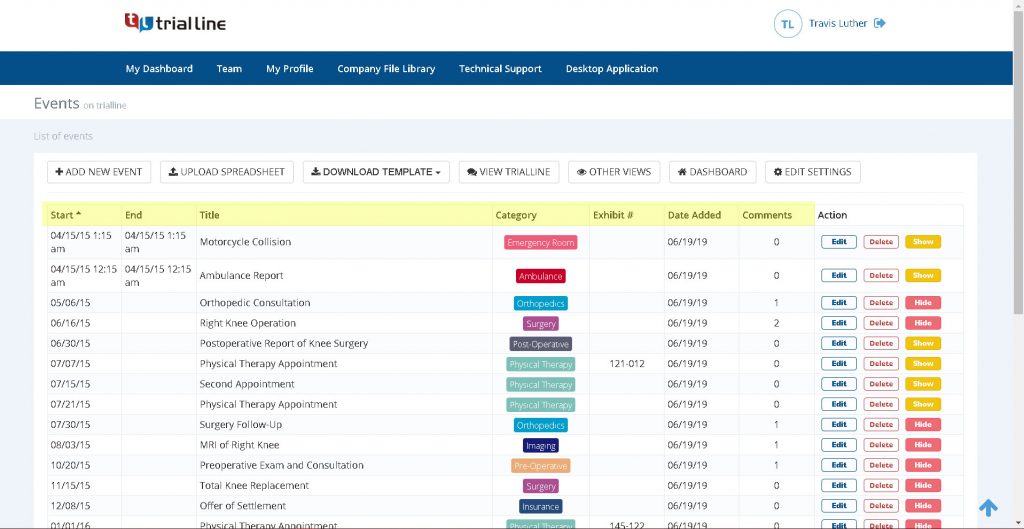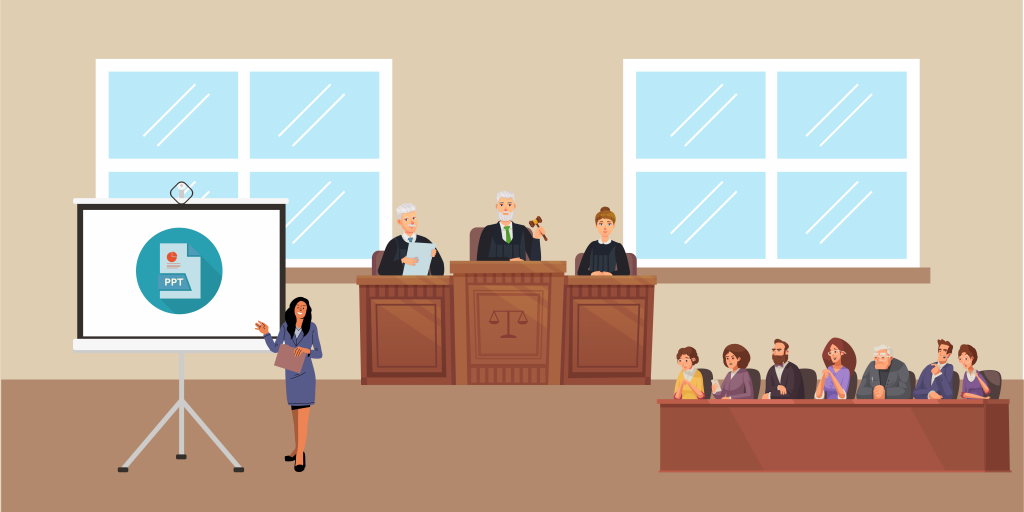As technology is increasingly integrated into legal proceedings, various legal tools are being examined and utilized to assess their effectiveness in real court trials. For instance, legal tech tools can be applied in simulated trials, such as mock trials, to evaluate their impact. Mock trials provide essential experience and insight into the criminal justice system and the complexities of the legal process. They also help participants sharpen their public speaking, critical thinking, and problem-solving skills while deepening their understanding of the law. Testing legal timeline software in a mock trial offers aspiring lawyers hands-on experience with courtroom technology and provides developers with valuable insights for improvements.
What is a Mock Trial?

A mock trial is an educational exercise that mimics are real legal case or dispute. Participants take in the roles of lawyers, witnesses, and other court personnel to recreate a courtroom environment. These exercises are designed for learning purposes, so no actual legal decisions are made by a judge. Instead, an instructor guides the participants, offering feedback and evaluating their performance.
In mock trials, each side presents its case, including delivering opening and closing statements, examining witnesses, and making arguments against opposing counsel. At the end of the trial, a “judge” typically determines a winner based on the evidence presented and the strength of the arguments.
Mock Trial vs Moot Court
Mock trials and moot courts offer invaluable opportunities for students, though they are designed to train students in different aspects of the legal field. While both mock trials and moot courts help students develop skills such as legal briefing, argumentation, and strategizing, the moot court specifically prepares students for the appellate court, focusing on oral arguments before a panel of judges. In contrast, mock trials teach students the procedural and evidentiary protocols they would encounter in a trial court. Many students participate in both mock trials and moot court organizations to gain a well-rounded legal education.
Why Legal Timeline Software is Essential in Mock Trials?
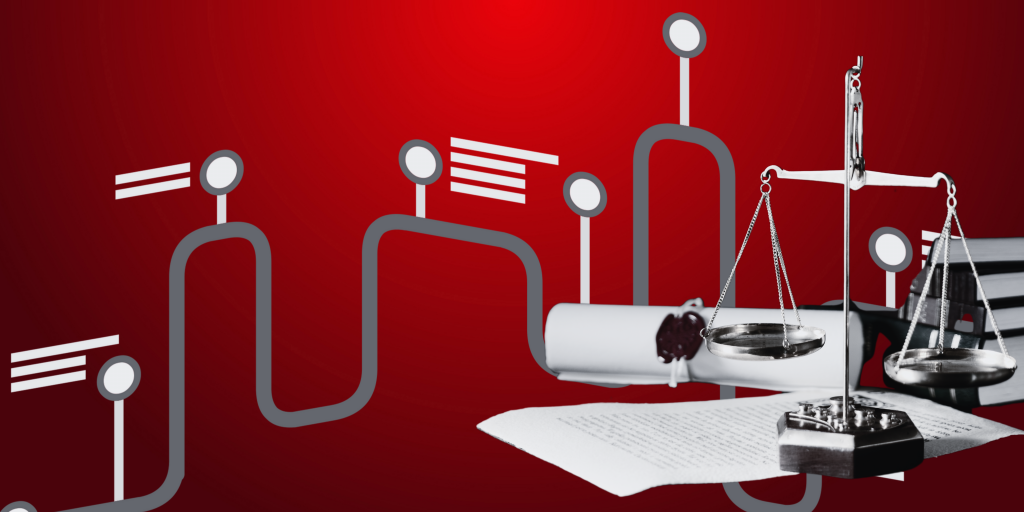
Mock trials serve as rehearsals for real trials. As legal technology becomes increasingly integrated into the evolving legal landscape, aspiring legal professionals can use legal timeline software to test arguments, witness testimonies, and overall case strategies. Implementing technology such as legal timeline software in mock trials offers several significant advantages:
Enhanced Case Presentation
A major advantage of using timeline software in a mock trial is the ability to present the case clearly and systematically. The visual representation of events aids the participants of the mock trial in better grasping the sequence of events and the case’s context. This clarity is essential for refining persuasive skills and effectively communicating key points.
Improved Strategy Development
By visualizing the timeline of events, aspiring legal professionals can identify potential weaknesses or gaps in their cases. This insight allows them to refine their strategy, address any issues, and strengthen their arguments before the actual trial. The ability to see the entire case laid in chronological order also helps in identifying any inconsistencies or contradictions in witness testimonies.
Efficient Time Management
Time is a critical factor both in mock and real trials. Case timeline software enables teams to manage their time more efficiently by providing a clear overview of the case’s progression. This helps in allocating sufficient time to each aspect of the case during the mock trial, ensuring that all key points are covered without rushing.
Collaboration and Team Coordination
Legal timeline software supports team collaboration by enabling members to collaborate in the case timeline, share insights, and make real-time updates. This cooperative approach ensures that everyone stays aligned and that the timeline remains accurate and current.
Preparation for Unexpected Scenarios
Mock trials are designed to prepare legal teams for the unexpected. By using trial preparation software, teams can stimulate various scenarios and test different approaches to the case. This preparation helps them to be more adaptable and confident when facing unforeseen challenges in the actual trial.
Key Features of Legal Timeline Software
Legal timeline software is a specialized tool designed to help legal professionals create, organize, and present a chronological timeline of events in a case. These timelines are essential for visualizing the sequence of events, which can be critical in understanding the context and developing a compelling narrative. The software typically allows users to input key dates, events, and relevant documents, which can then be displayed in a clear and visually appealing format.
To understand legal timeline software, here are some key features.
Intuitive interface
Most legal timeline software offers an intuitive interface that is easy to navigate, even for those who need to be tech-savvy. This user-friendly design ensures that legal teams can quickly create and modify timelines as required. Some software providers also offer demos to help users learn more about the software.
Customization options
Legal cases are unique, and the software gives various customization options to tailor the timeline to the specific needs of the case. Users can adjust the timeline’s appearance, add notes, and link relevant documents or exhibits.
Collaboration tools
Legal timeline or court case timeline software often includes collaboration features that allow multiple team members to work on the timeline simultaneously. This is particularly useful in mock trials, where different team members are responsible for various aspects of the case.
Integration with other tools
Many legal timeline software solutions can integrate with other legal tools and case management systems, streamlining the workflow and ensuring that all case information is easily accessible.
Choosing the Right Legal Timeline Software
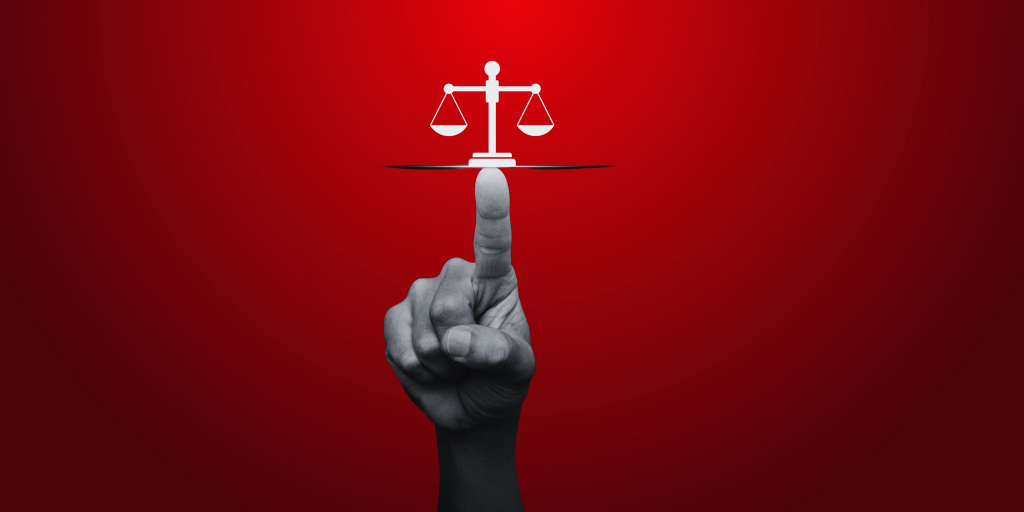
With various legal timeline software options available, it is important to choose the one that best suits your needs. Here are some factors to consider:
Ease of use
The trial timeline software should be easy to use, with an intuitive interface that allows users to create and modify timelines quickly. Look for software that offers drag-and-drop functionality, customizable templates, or user-friendly navigation.
Compatibility
Ensure that the software is compatible with other tools and systems that your legal team uses. Integration with case management systems, document management tools, and legal presentation software can significantly enhance the efficiency of your workflow.
Customization options
Every case is different, and the software should offer customization options to tailor the specific needs of your case. This includes the ability to add notes, links, and annotations, as well as customize the timeline’s appearance.
Collaboration features
Choose a software that offers multiple collaboration options, enabling team members to work on the timeline simultaneously. This feature adds flexibility to mock trials, allowing team members to contribute to the timeline according to their assigned roles.
Cost-effectiveness
Budget is an important factor to consider when selecting a legal timeline software. Evaluate the cost of the software alongside the features it offers at that price. Also, check for any additional fees for updates or support. Prioritize the software that aligns with both your budget and your needs.
Choosing the right legal timeline and leveraging its features significantly increases the chance of success of legal teams in both mock and real trials.
TrialLine: The Legal Timeline Software of Your Choice
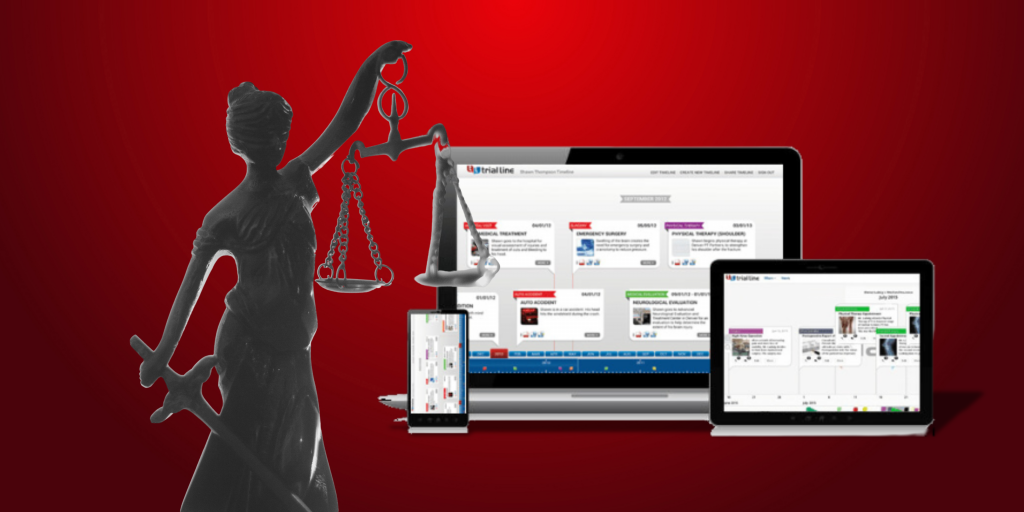
Trial presentation tools have become crucial for adapting to evolving technology and improving the efficiency of legal timeline presentations, as well as overall document and law office management. Among the many tools available, TrialLine stands out as an exceptional choice. TrialLine is a cloud-based software designed for law firms and attorneys who want a comprehensive understanding of their cases, offering features for mediation, trial presentation, and storytelling timelines.
TrialLine’s features include:
Event-by-event detail
Legal practitioners can input key events, milestones, and actions related to the case into TrialLine, enabling them to organize these events in chronological order. This creates a timeline that reflects the sequential flow of events in the case.
Test summaries and supporting documents
To enhance the presentation of the case events in the timeline, TrialLine allows users to include text summaries. These brief descriptions offer insights into what transpired at the specific case events.
Contributor comments
TrialLine empowers users to enable comments, allowing contributors to provide insights on the events shared with them. Collaborators can share perspectives, legal interpretations, or pertinent information that may not be apparent from the event description alone.
Visually appealing timelines
As a software that doubles as a case presentation software, Trialline lets users assign color codes, add thumbnails, background images, and specific titles, as well as a functional icon to access attachments and comments. It also offers various layouts, providing flexibility in how users choose to view the timeline.
Sharing timelines publicly
Timelines can be shared with individuals outside an organization, setting precedents. This accessibility enables both legal professionals and the general public to review and reference the timelines in the context of similar cases, improving understanding of legal outcomes and decisions. Publicly sharing timelines can serve educational, advocacy, and awareness purposes.
Mock Trials with TrialLine
Mock trials and moot court competitions help aspiring legal professionals prepare for real-life trial scenarios. These activities give them a glimpse of what to expect and help them develop quick problem-solving and strategic thinking skills. As the legal field increasingly embraces technology, it’s crucial to integrate digital tools that they can use in actual cases.
A great tool to start with is legal timeline software like TrialLine. TrialLine’s features are easy to learn and integrate into mock trials, aiding law students in organizing their mock cases, collaborating, and presenting effectively. Sign up for free and build comprehensive visual timelines with TrialLine!




